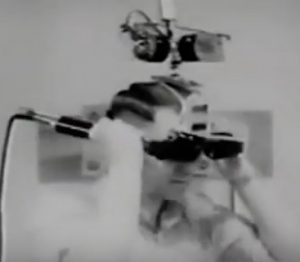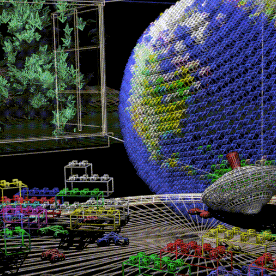 But why are there no AR-Unicorns around, beside Magic Leap. This is a key question asked in the AR space for quite a while now. Most people people don't even understand, why should there be AR-Unicorns at all. Only if you go deeper into the analysis you understand the vastness. If AR glasses go mainstream, it means that they are indistinguishable from normal spectacles. The display experience is so good that they make any smartphone, tablet, desktop monitor, TV or game console obsolete. The new immersive vision create new social and working environments and disrupts the communication and media landscape. But on top, people will share a top virtual layer, visible by all users through the AR-glasses. Since this space is shared by all users, the objects and the use-right of this layer miraculously reveal a vast wealth of virtual assets with real world value. This trillion dollar reward should be enough to put some thoughts and efforts into the project.
But why are there no AR-Unicorns around, beside Magic Leap. This is a key question asked in the AR space for quite a while now. Most people people don't even understand, why should there be AR-Unicorns at all. Only if you go deeper into the analysis you understand the vastness. If AR glasses go mainstream, it means that they are indistinguishable from normal spectacles. The display experience is so good that they make any smartphone, tablet, desktop monitor, TV or game console obsolete. The new immersive vision create new social and working environments and disrupts the communication and media landscape. But on top, people will share a top virtual layer, visible by all users through the AR-glasses. Since this space is shared by all users, the objects and the use-right of this layer miraculously reveal a vast wealth of virtual assets with real world value. This trillion dollar reward should be enough to put some thoughts and efforts into the project.
But the problems with AR glasses are so many fold and deep, that few people dare to put more energy into it: Read the full article at KaraSpace.net
David Smith holds an interesting talk about the AR at TEDx.
 Computers can manipulate large data sets; but humans cannot. With the right head-wearable display though, a person might be able to visualize and interactively control millions of objects simultaneously.
Computers can manipulate large data sets; but humans cannot. With the right head-wearable display though, a person might be able to visualize and interactively control millions of objects simultaneously.
You could, for example, take an Excel spreadsheet with thousands of rows and columns and explore the data in a virtual space. The goal is to create a platform that permits augmented conversations where the users of the system are able to communicate and explore complex new ideas with each other that can't be imagined today.
Read more in the Youtube post. https://www.youtube.com/embed/uDFxvKrMSJ0
Theis dream is the hart of the KaraSpace development. But paired with the monetization of the virtual objects and trust in privacy, using blockchain principles. The Smalltalk system is the only way to handle this complexity.
Croquet AR systems ware already implemented very early in Smalltalk. https://www.youtube.com/embed/mOZPW8l85eI?rel=0
Amazing conversation about essential cognition
In the video below, Eric Hanson and Mike of Aquameta are addressing a key defect in the social fabric of the software industry. 
In essence, the software industry is holding back the empowering means for easy end user programming. Instead, software engineering tools are made so complex and inaccessible that normal people can not access them. Software is used primarily in the interest of big corporations.
The core action of object oriented programming is very easy and human. Everybody is doing these processes in his mind every day. With the help of graphical representation of the objects and with the right development environment, the power of end user programming can be restored.
At KaraSpace, we absolutely endorse this. But we will put an other dimension on top. In the coming age of Augmented Reality, trust and open source are prerequisites, if software is not to become the means of suppression and manipulation. End user programming is the key to end user program comprehension of open source programs, and self-determination.
The video with the amazing conversation on Youtube
https://www.youtube-nocookie.com/embed/cWGm9eYUYUk?rel=0&
 But why are there no AR-Unicorns around, beside Magic Leap. This is a key question asked in the AR space for quite a while now. Most people people don't even understand, why should there be AR-Unicorns at all. Only if you go deeper into the analysis you understand the vastness. If AR glasses go mainstream, it means that they are indistinguishable from normal spectacles. The display experience is so good that they make any smartphone, tablet, desktop monitor, TV or game console obsolete. The new immersive vision create new social and working environments and disrupts the communication and media landscape. But on top, people will share a top virtual layer, visible by all users through the AR-glasses. Since this space is shared by all users, the objects and the use-right of this layer miraculously reveal a vast wealth of virtual assets with real world value. This trillion dollar reward should be enough to put some thoughts and efforts into the project.
But why are there no AR-Unicorns around, beside Magic Leap. This is a key question asked in the AR space for quite a while now. Most people people don't even understand, why should there be AR-Unicorns at all. Only if you go deeper into the analysis you understand the vastness. If AR glasses go mainstream, it means that they are indistinguishable from normal spectacles. The display experience is so good that they make any smartphone, tablet, desktop monitor, TV or game console obsolete. The new immersive vision create new social and working environments and disrupts the communication and media landscape. But on top, people will share a top virtual layer, visible by all users through the AR-glasses. Since this space is shared by all users, the objects and the use-right of this layer miraculously reveal a vast wealth of virtual assets with real world value. This trillion dollar reward should be enough to put some thoughts and efforts into the project.
 Computers can manipulate large data sets; but humans cannot. With the right head-wearable display though, a person might be able to visualize and interactively control millions of objects simultaneously.
Computers can manipulate large data sets; but humans cannot. With the right head-wearable display though, a person might be able to visualize and interactively control millions of objects simultaneously.